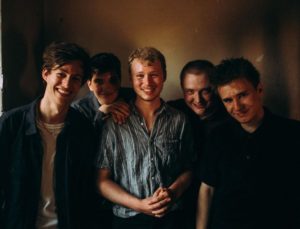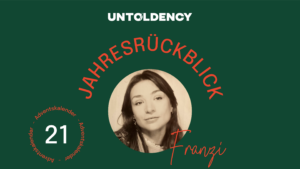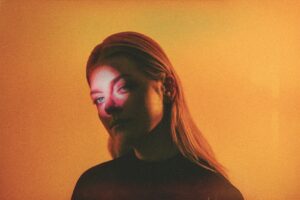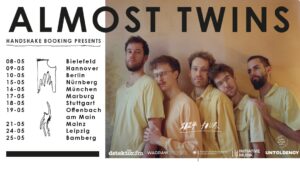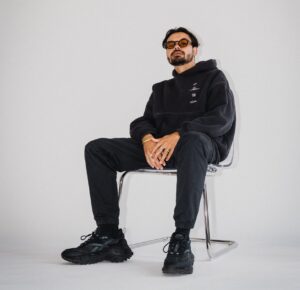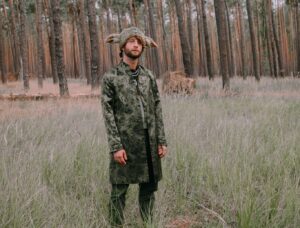Anfang Dezember durfte ich ein Interview mit dem syrischen Singer-Songwriter Yousef Kekhia führen und jetzt, knapp zwei Monate später nachdem ich es endlich geschafft habe, die Worte zu Papier zu bringen, bin ich immer noch berührt über die liebe Offenheit und ruhige Aufrichtigkeit, mit der wir über seine Musik gesprochen haben.
Damit ihr es musikalisch einordnen könnt: Yousef Kekhia singt arabische Texte auf zeitgenössischen Folk-Melodien mit elektronischen Elementen. Er schafft so intime Soundatmosphären, die mich öfter an RY X denken lassen – und das ist nicht mal ein hochgegriffener Vergleich. 2019 erschien sein Debütalbum Monologue, auf dem er seine Flucht aus Aleppo verarbeitete und auch persönlichen Themen wie Hoffnung, Depression, Enttäuschung und Liebe einen Platz bot. Nach diesem Selbstgespräch (Monolog) folgt nun sein zweites Album Polylog, welches die Perspektive weg von ihm und auf die Menschen um ihn rum lenkt. Es geht um verschiedene bewegende Begegnungen, die alle ihren Weg auf das Album geschafft haben – darunter sind auch viele Begegnunge von Frauen, die das Thema Feminismus und das Aufwachsen in unserer nun doch sehr patriachal-strukturierten Gesellschaft immer wieder aufgreifen. Aber lest selbst:
Yousef Khekira im Interview
Anna: Hey Yousef, to dive right in: Would you like to introduce yourself and your music to everyone who doesn’t know you yet?
Yousef: So, I’m Yousef. I’m originally from Syria and now in Berlin for a couple of years. And to describe my music: My mother’s tongue language is Arabic, and I sing in Arabic, but in a very informal way. So very simple songwriting mixed with different styles of music. I was inspired by a lot of folk music back then and also electronic music. So, I don’t like to put it in one genre or one word. Instead, I like to keep it open and for me to be always motivated to do this combination of so many different stories, experiences and cultures. This is just what I try.
Anna: Your first song “Hal ard Lamin?” (“Who owns the earth?“) was the door opener into your world of music. What is the song about?
Yousef: It’s the first song I’ve ever released, so it holds a special place in my heart. It’s the song where it’s, to me, very clear why I love it. Or why I was interested in releasing it publicly because before, I always did music as a hobby. And it’s in these times where politics pushed me really to try to bring a message to the world, something that I think would make it a better place. This song talks about borders, criticizing the idea of borders and how we look at them. Back then when I wrote the song, I was still in Turkey. It was when these refugee stories were all around the media and people were risking the lives coming to Europe and so on. So, it moved me a lot, yeah. It’s very political to me.

Mit dem Laden des Videos akzeptieren Sie die Datenschutzerklärung von YouTube.
Mehr erfahren
“Making music became something healing and blossoming.”
Anna: I can hardly imagine what painful experiences have shaped the songs of your first album “Monologue” – but despite the Arabic language that I don’t understand, I can somehow feel the emotions you’re trying to portray with your songs. Does making music help you to process all that you have experienced before and since you left Syria?
Yousef: It definitely helps, yes. At the beginning, it was kind of a way to deal with all these things that I lived through. And then, interestingly, it became about healing and kind of blossoming, you know. The music that I make or the art that I use to express myself to kind of heal and build a home for myself. It grew into something even better in my life. Something that would make me grow as a person and feel really excited and happy about life. I studied architecture, for example, and I always thought, “OK, I’m going to be an architect because I really like it and I’m going to be happy”. And it’s not even comparable to how I feel with music. Because it’s something that makes me feel alive and motivated. I’m really grateful to be able to do my thing.
Anna: How did you find your love to music? What artists and moments have shaped you musically?
Yousef: As far as I remembered, since being a kid, we listened to a lot of traditional music. And honestly, like nowadays, this music doesn’t exist anymore, unfortunately. But it’s like very musically rich, it’s for sure also commercial, it’s very popular, but the music is so rich, incredibly complicated and beautiful in a very simple way. So, we had this, but at the same time, my father has had vinyls of the Beatles, Rolling Stones and Pink Floyd, which is not very often in Syria. My brother, who is like eight years older than me, worked in a CD store, so at this time we also had the really nice 90s music that we grew up listening to. So, I had this whole combination of different music influences, it was kind of always there growing up with me.
And yeah, then I think in high school I was like “yeah, I want to be in a band!” And it was ninth grade or something, there was this idea. Me and my friends, nobody did music before (laughs). I didn’t even try to sing before then, maybe only humming. I didn’t know if I even had a nice voice or not. Then I started recording on a phone to listen to how I sound. I think a year later we did our first concert. It was so embarrassing (laughs). Had my hands in my pocket the whole time. And yeah, then I started writing my own music around 2014.
Anna: Did you play an instrument?
Yousef: No, I always sang. I started learning the guitar I think at around the time when I left Syria, between 2011 and 2013. And then, slowly, got also interested in other instruments. But singing was always the main thing.
Anna: When did you add the electronic vibe?
Yousef: In Berlin. But I’ve always had interest. I mean, even as a kid, I listened to a lot of electronic sounds. I think Berlin had this like more expressive electronic music dance scene, but trippy at some times.

“It was very easy for me to see that women don’t get treated as fair as men in the society.”
Anna: On Friday, your second album “Polylog” will be released. It’s an album just as personal and touching as the first one, but looks more towards the future. Which topics did you deal with on “Polylog“?
Yousef: As you mentioned, the first album “Monologue” was really personal, and so is this one. I’m a very personal songwriter that writes a lot about people’s personal stories, even if they’re not my own. But still, I always write very personal, and it would also seem like that, I think, to everybody who listens and connects to the songs. “Polylog” is not only about me, but also about encounters I had in Germany. About exchange, about knowledge and about political and social topics. How I feel about feminism and growing up in a very kind of man-dominated culture.
For me, it always felt normal that I see myself as a feminist. But I didn’t really think about it because I had my sisters and it was very easy for me to see that they don’t get treated as fair as men in the society, not as fair as my brother and me. So it was easy for me to see the difference and to admit it since I was a kid. It was not this moment where I felt like, “OK, I want to support women”, but it was rather from the beginning, realizing that it’s incredibly wrong how whole societies are formed. Even here in Germany, it’s not only in Arabic countries or Syria.
I think in this album, like after settling here and being more interested in also talking about these topics, I learned a lot. I still learn a lot, we all learn every day, and I think I was never ashamed to ask the women around me and to talk about it. For some people, they think maybe it’s a stupid question. But I think if you show respect, then the other will appreciate your question. And that’s exactly how “Polylog” happened. Like all these encounters with women that I met, whatever the reason of the relationship was, it was so inspiring and mind blowing for me. Really, on all aspects, it was.
Of course, the album is written from my perspective, so it’s a little bit about me, but it’s more the side of me of how I’m shaped from these encounters. What inspires me and the whole idea about how they feel as women in general and in this society.
“The album is about learning, growing and being as humble as we can.”
Anna: Was there an encounter that kind of stuck to you or was really moving?
Yousef: I wouldn’t say so, no. The album is not about me as a person. It’s not about what I felt. It’s about the topics, it’s about being as humble as we can, as people. It really resembles how we can grow as a society and I think that’s very beautiful.
If you remove the attention from the way a person is, if they are like attractive or charismatic, you see that these things don’t matter. It’s about learning and growing and being vulnerable and supporting each other and opening up to talks and discussions about things we wouldn’t dare to talk about. Even here. As I said, I was so surprised that there are so many things where I felt it’s normal to talk about, but I find out there are a lot of people who don’t feel comfortable talking about these things.
Anna: Do you have a song on the album that still kind of feels special to you?
Yousef: I think the second single, “Al Rabta” (“the hair-tie”). I almost didn’t put it out. I don’t know if this is an interesting story, but I remember I showed it my team and was really going to leave it out because it was not working. But I had a very strong feeling inside of me that said “no, it’s a special song. It will work.” It’s just about, just letting go of expectations. I remember I went back to the studio and I just jammed. I put it on loop and just had fun. It became one of my favorite songs on the album.
But this is more like producing. I don’t know if I would say there’s a special song. Maybe the last song on the album, “Sar Al Waet” (“it is time”), it’s I think the most emotional song on the album.

Mit dem Laden des Videos akzeptieren Sie die Datenschutzerklärung von YouTube.
Mehr erfahren
“I have anxiety. Big one. But still, I wish I could play live every day.”
Anna: I can imagine it to be more than beautiful when you bring these soundscapes come to life on stage. Does playing your songs live change the way you see them?
Yousef: Definitely. A lot. I love playing live. I have anxiety. Big one. But still, I wish I could play every day. It’s very strange. It shows you how much I appreciate playing life, even though that I have a stage anxiety. This hunger for me to play life is driven by my love for music. It’s really a privilege to be able to practice your job, and it’s not only in the studio. That’s not how I perceive music. I know that I love to be in the studio to produce, but playing live just brings another dimension to it. Another dimension to the music. Connections with the audience. Meeting people randomly. I love to talk to people after the concerts. I wouldn’t imagine one day that I stopped doing that, to just go there and talk to people after the concert.
Anna: Encounters.
Yousef: Right! Encounters (laughs).
I also like how I could play with the songs. There is no song that’s one hundred percent how it is on the album. I always like to change things, for example, this synth line that I played all the time, one day I decided, “OK, I don’t like it anymore”, then I just do another thing or play with the structure of. It’s like rearranging the song on the fly, and I enjoyed it a lot.
Anna: That sounds really nice. And that brings us to the last question: It’s about an untold story that you’ve never shared before in an interview.
Yousef: I talk a lot (laughs). And I’m very open, meaning that it’s really rare that I have something I didn’t share before. Hmm (takes a minute to think).
I really, really was so close to leaving Germany after the second year or so. I thought I made a wrong decision, not about anything particular, but nothing was really working or connecting in my mind. And I think politically it was still, I don’t know. And language was also a big challenge. It just didn’t feel like it was the way to go. I don’t know. There were so many reasons behind it, but I really was very close to trying something else, which is very weird why I’m mentioning this. Maybe because I’m really happy that I didn’t do that.
Anna: What made you change your mind?
Yousef: I think, um, I don’t know. I like to give things a chance in life. I think I’m also someone who, when I do something, I like to do it until the end. Even with music. I’m not a fast quitter. So I just said I’ll give it a chance and yeah.
Anna: I’m really glad you did.
Folgt Yousef Kekhia hier und hört seine Musik hier:
Klicken Sie auf den unteren Button, um den Inhalt von Spotify zu laden.
Fotocredit: Rebecca Rütten


